Module 3 Heroes 模块小结课件(38张PPT)
文档属性
| 名称 | Module 3 Heroes 模块小结课件(38张PPT) |
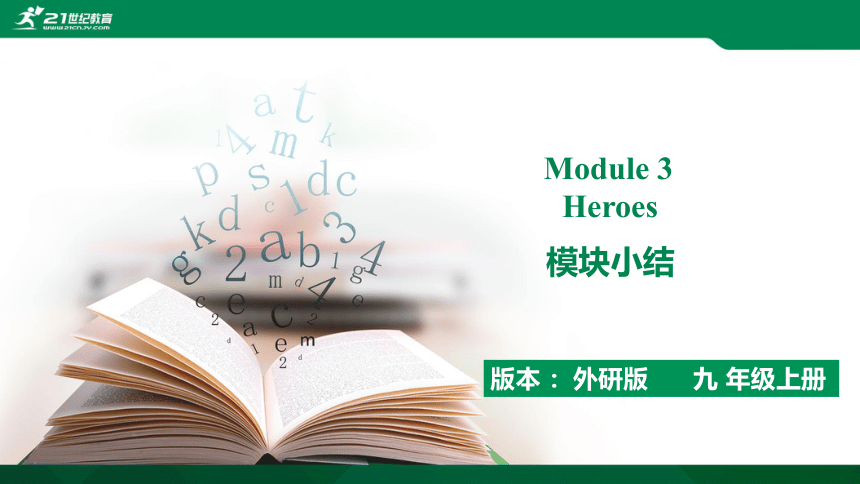
|
|
| 格式 | ppt | ||
| 文件大小 | 1.8MB | ||
| 资源类型 | 试卷 | ||
| 版本资源 | 外研版 | ||
| 科目 | 英语 | ||
| 更新时间 | 2020-09-25 00:00:00 | ||
图片预览

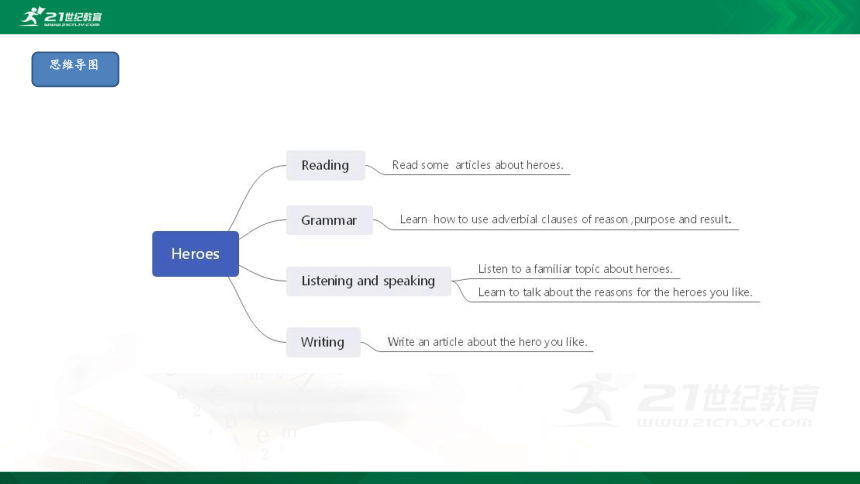
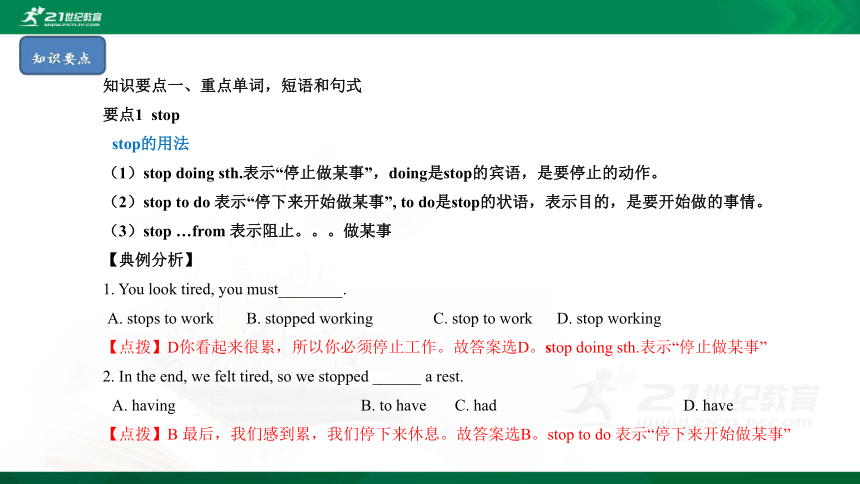
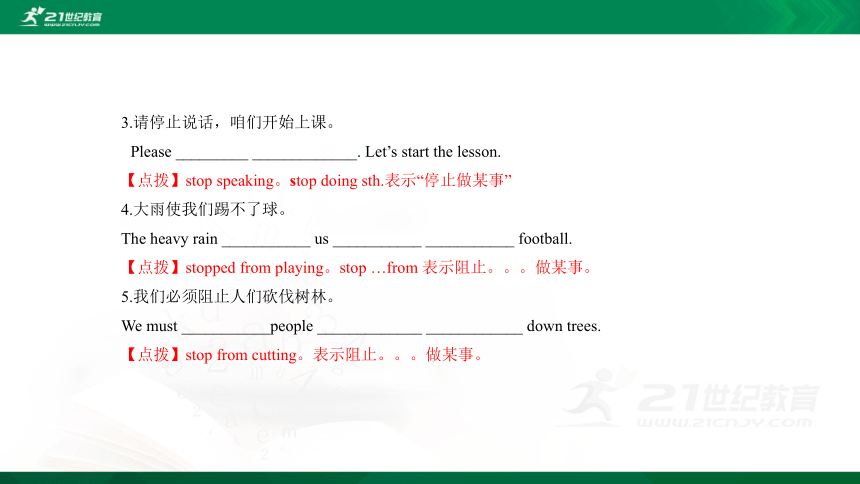
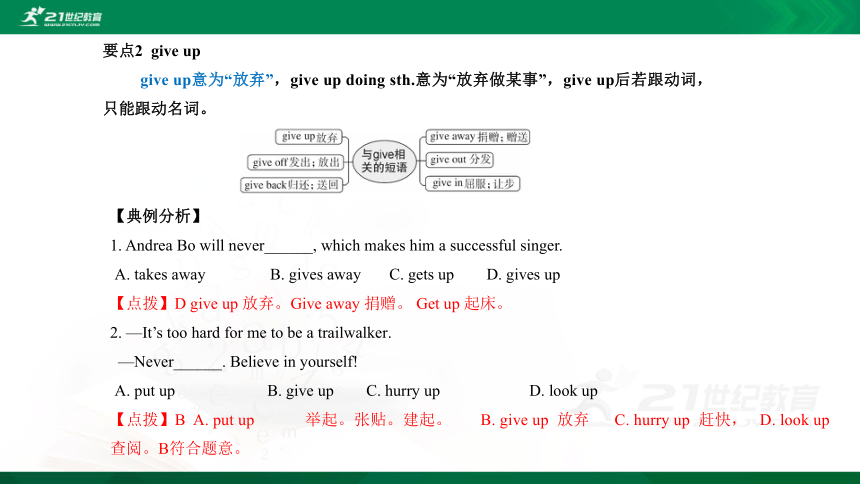
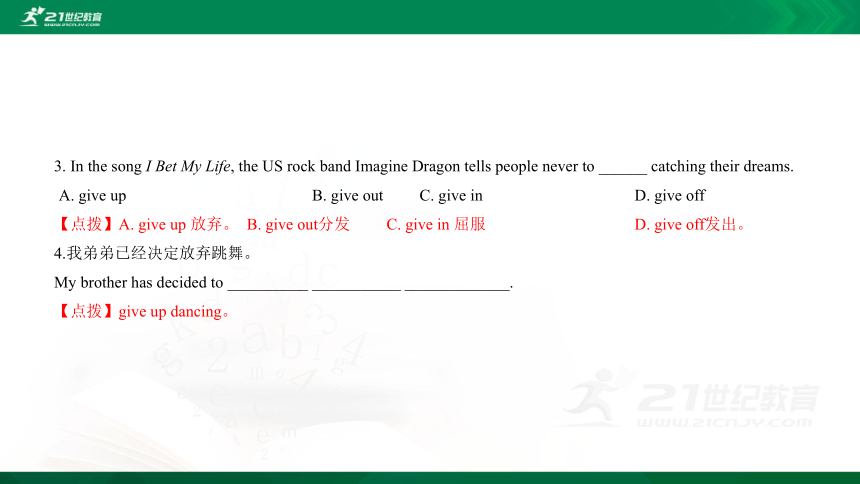
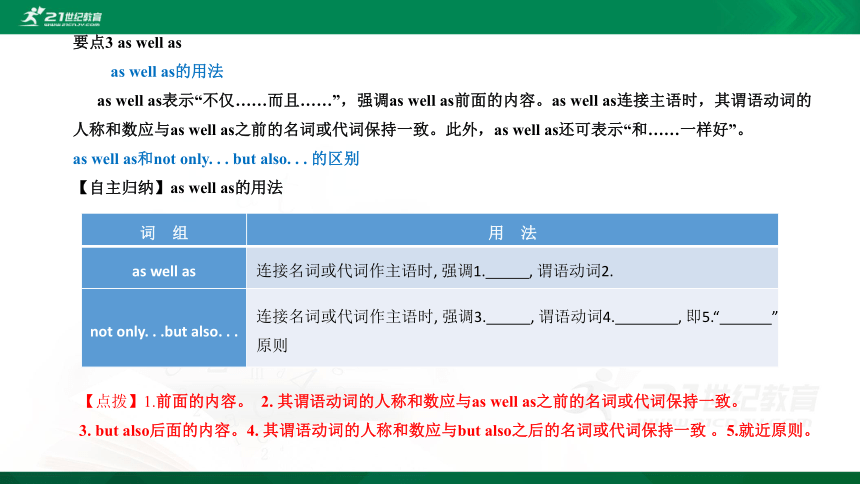
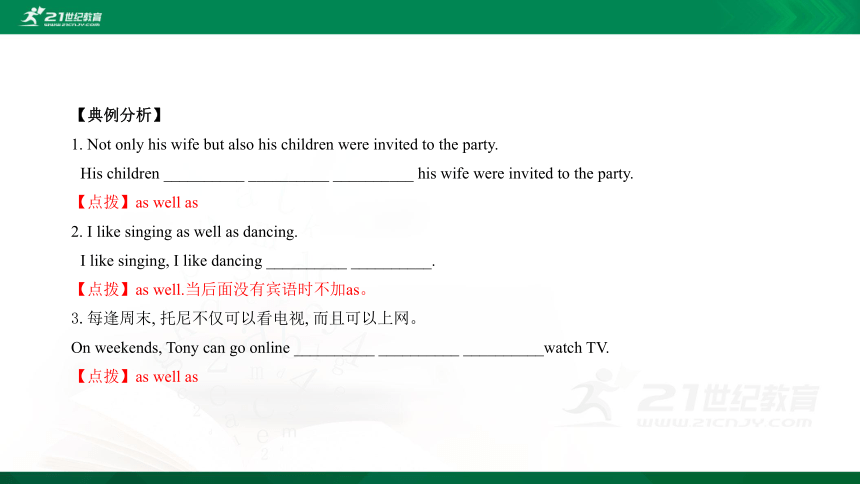
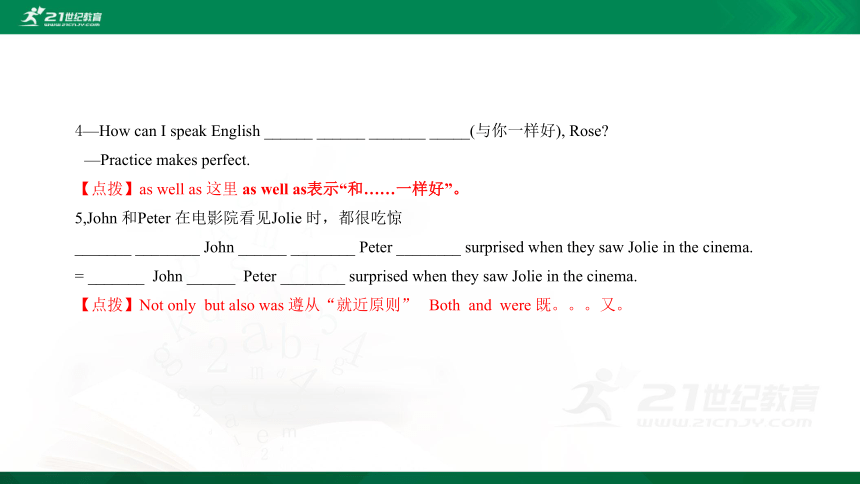
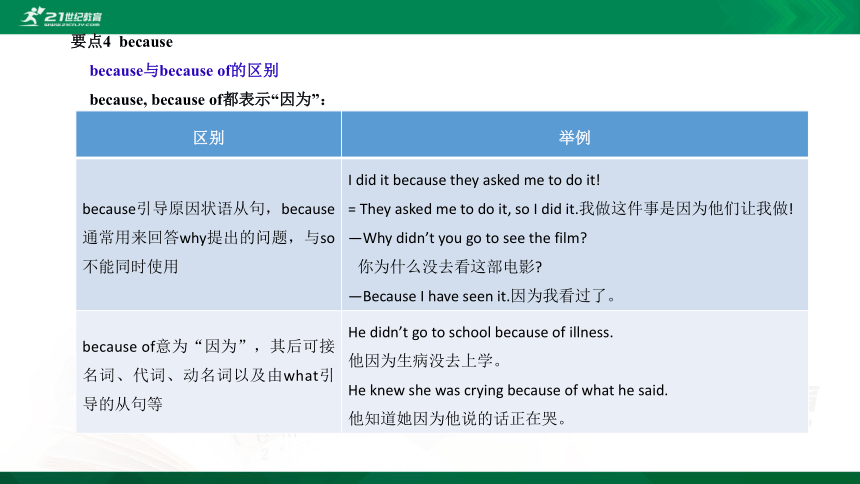
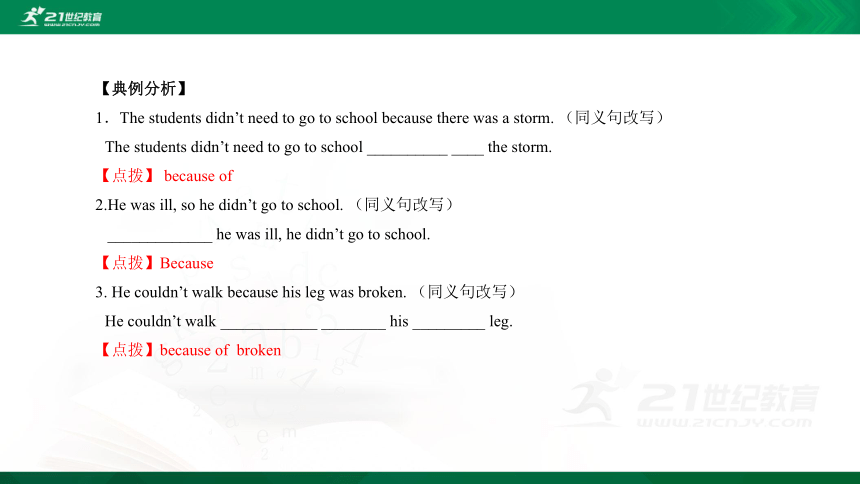
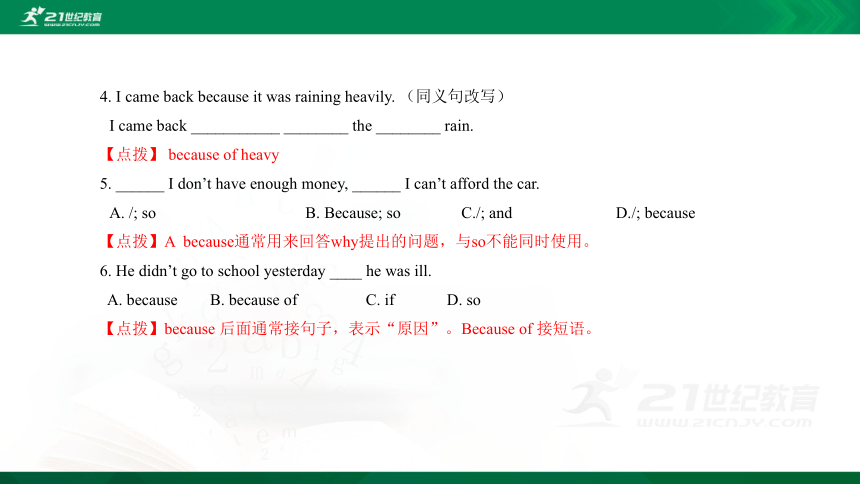
文档简介
Module 3
Heroes
模块小结
版本 :外研版 九 年级上册
思维导图
知识要点一、重点单词,短语和句式
要点1 stop
stop的用法
(1)stop doing sth.表示“停止做某事”,doing是stop的宾语,是要停止的动作。
(2)stop to do 表示“停下来开始做某事”, to do是stop的状语,表示目的,是要开始做的事情。
(3)stop …from 表示阻止。。。做某事
【典例分析】
1. You look tired, you must________.
A. stops to work B. stopped working C. stop to work D. stop working
【点拨】D你看起来很累,所以你必须停止工作。故答案选D。stop doing sth.表示“停止做某事”
2. In the end, we felt tired, so we stopped ______ a rest.
A. having B. to have C. had D. have
【点拨】B 最后,我们感到累,我们停下来休息。故答案选B。stop to do 表示“停下来开始做某事”
3.请停止说话,咱们开始上课。
Please _________ _____________. Let’s start the lesson.
【点拨】stop speaking。stop doing sth.表示“停止做某事”
4.大雨使我们踢不了球。
The heavy rain ___________ us ___________ ___________ football.
【点拨】stopped from playing。stop …from 表示阻止。。。做某事。
5.我们必须阻止人们砍伐树林。
We must ___________people _____________ ____________ down trees.
【点拨】stop from cutting。表示阻止。。。做某事。
要点2 give up
give up意为“放弃”,give up doing sth.意为“放弃做某事”,give up后若跟动词,只能跟动名词。
【典例分析】
1. Andrea Bo will never______, which makes him a successful singer.
A. takes away B. gives away C. gets up D. gives up
【点拨】D give up 放弃。Give away 捐赠。 Get up 起床。
2. —It’s too hard for me to be a trailwalker.
—Never______. Believe in yourself!
A. put up B. give up C. hurry up D. look up
【点拨】B A. put up 举起。张贴。建起。 B. give up 放弃 C. hurry up 赶快, D. look up查阅。B符合题意。
3. In the song I Bet My Life, the US rock band Imagine Dragon tells people never to ______ catching their dreams.
A. give up B. give out C. give in D. give off
【点拨】A. give up 放弃。 B. give out分发 C. give in 屈服 D. give off发出。
4.我弟弟已经决定放弃跳舞。
My brother has decided to __________ ___________ _____________.
【点拨】give up dancing。
要点3 as well as
as well as的用法
as well as表示“不仅……而且……”,强调as well as前面的内容。as well as连接主语时,其谓语动词的人称和数应与as well as之前的名词或代词保持一致。此外,as well as还可表示“和……一样好”。
as well as和not only. . . but also. . . 的区别
【自主归纳】as well as的用法
词 组
用 法
as well as
连接名词或代词作主语时, 强调1. , 谓语动词2.
not only. . .but also. . .
连接名词或代词作主语时, 强调3. , 谓语动词4. , 即5.“ ”原则
【点拨】1.前面的内容。 2. 其谓语动词的人称和数应与as well as之前的名词或代词保持一致。
3. but also后面的内容。4. 其谓语动词的人称和数应与but also之后的名词或代词保持一致 。5.就近原则。
【典例分析】
1. Not only his wife but also his children were invited to the party.
His children __________ __________ __________ his wife were invited to the party.
【点拨】as well as
2. I like singing as well as dancing.
I like singing, I like dancing __________ __________.
【点拨】as well.当后面没有宾语时不加as。
3.每逢周末, 托尼不仅可以看电视, 而且可以上网。
On weekends, Tony can go online __________ __________ __________watch TV.
【点拨】as well as
4—How can I speak English ______ ______ _______ _____(与你一样好), Rose?
—Practice makes perfect.
【点拨】as well as 这里 as well as表示“和……一样好”。
5,John 和Peter 在电影院看见Jolie 时,都很吃惊
_______ ________ John ______ ________ Peter ________ surprised when they saw Jolie in the cinema.
= _______ John ______ Peter ________ surprised when they saw Jolie in the cinema.
【点拨】Not only but also was 遵从“就近原则” Both and were 既。。。又。
要点4 because
because与because of的区别
because, because of都表示“因为”:
区别
举例
because引导原因状语从句,because通常用来回答why提出的问题,与so不能同时使用
I did it because they asked me to do it!
= They asked me to do it, so I did it.我做这件事是因为他们让我做!
—Why didn’t you go to see the film?
你为什么没去看这部电影?
—Because I have seen it.因为我看过了。
because of意为“因为”,其后可接名词、代词、动名词以及由what引导的从句等
He didn’t go to school because of illness.
他因为生病没去上学。
He knew she was crying because of what he said.
他知道她因为他说的话正在哭。
【典例分析】
1.The students didn’t need to go to school because there was a storm. (同义句改写)
The students didn’t need to go to school __________ ____ the storm.
【点拨】 because of
2.He was ill, so he didn’t go to school. (同义句改写)
_____________ he was ill, he didn’t go to school.
【点拨】Because
3. He couldn’t walk because his leg was broken. (同义句改写)
He couldn’t walk ____________ ________ his _________ leg.
【点拨】because of broken
4. I came back because it was raining heavily. (同义句改写)
I came back ___________ ________ the ________ rain.
【点拨】 because of heavy
5. ______ I don’t have enough money, ______ I can’t afford the car.
A. /; so B. Because; so C./; and D./; because
【点拨】A because通常用来回答why提出的问题,与so不能同时使用。
6. He didn’t go to school yesterday ____ he was ill.
A. because B. because of C. if D. so
【点拨】because 后面通常接句子,表示“原因”。Because of 接短语。
要点5 manage to do sth.
manage to do sth.,try to do sth.与try doing sth.的用法:
①manage to do sth.意为“设法做成某事”,强调结果,事情已经成功,相当于succeed?in?doing sth.。如:
He managed to send the passengers to the airport in time.
他设法把乘客及时送到了机场。
②try to do sth.意为“努力/设法/试图/尽力去做某事”,强调过程,能否成功不确定。如:
We tried to stop him smoking in bed but he would do it.
我们试图阻止他在床上吸烟,但他就是不听。
③try doing sth.意为“试着做某事”,表示抱着试试看的想法去做。如:
Let’s try knocking at the back door. Maybe he is sleeping.
咱们敲敲后门试试。可能他在睡觉。
【典例分析】
1.If you manage __________(exercise)every day, you will be healthy.
【点拨】to exercise。manage to do sth.意为“设法做成某事”
2. 我听说医生们设法救活了那个孩子。
I hear the doctors the child’s life .
【点拨】manage to save
要点6 sick
ill?与sick的用法:ill?和sick都有“生病的;有病的”之意,但用法并不完全相同。??
ill?意为“生病的;有病的”,一般用作表语,不能作定语。如:
The little child is ill. 这个小孩子生病了。// My mother feels ill. 我的妈妈感觉不舒服。
② sick?意为“生病的;(感觉)不适的”,既可作表语又可作定语,如:“病人”可以说a sick man,但不能说an ill man。如:
She is sick in bed. 她卧病在床。(作表语)// She is looking after her sick father. 她在照顾她生病的父亲。(作定语)
【典例分析】
1. Tom is looking after his ________ mother, because she was ________ in bed with a cold.
A. sick; illness B. ill; ill C. sick; ill D. ill; sick
【点拨】C ill?意为“生病的;有病的”,一般用作表语,不能作定语。sick?意为“生病的;(感觉)不适的”,既可作表语又可作定语。illness 名词。病。故答案选C。
2. 那只可怜的狗因疾病而死。
That poor dog an ____________.
【点拨】died of illness。illness 疾病。名词。
3. Sam, could you please look after my ______ dog while I’m away?
A. ill B. sick C .illness D. sickness
【点拨】B。sick?意为“生病的;(感觉)不适的”,既可作表语又可作定语。而ill不做定语。
4. The sick ______ in need of medication(药物治疗).
A. are B. was C.is D. been
【点拨】A the sick 病人们。集体名词。故用复数。
?
要点7 die
dying 是形容词,意为“垂死的;将要死去的”。be dying for 渴望。如:
She takes care of the dying man carefully. 她细心地照顾那名垂死的男人。
The little girl cried when she saw her?dying?cat. 看到快死的小猫,小女孩哭了。
【拓展】die是动词,意为“死;枯竭”;dead是形容词,意为“死的”;death是名词,意为“死;死亡”。
die of与die?from?的用法:
① die of意为“死于……”,指死于疾病,衰老,感情,饥寒等内在原因。如:
The beggar died of hunger and cold. 这个乞丐死于饥饿和寒冷。
② die?from?意为“死于……”,指死于外伤、事故、劳累过度等外在原因。如:
The old man died from a traffic accident. 那位老人死于交通事故。
【典例分析】
die的不同搭配
词 组
用 法
die for
动词短语, 其后常接名词或代词, 意为1. “ ”, 还可表示“渴望……, 向往……”, 表示强烈的语气
die of
常指由2. 造成的死亡, 表示3. “ ”
die from
常指由4. 造成的死亡, 表示 5.
【点拨】1.为。。。而死 2. 内在原因 3. “死于……” 指死于疾病,衰老,感情,饥寒等 4. 外在原因 5. “死于……”,指死于外伤、事故、劳累过度等
一、选词填空(die for/die from/die of)。
1.The slaves(奴隶)would like to __________freedom.
【点拨】die for 表示“渴望……, 向往……”
2.More than one thousand people __________that earthquake.
【点拨】died from。死于……”,指死于外伤、事故、劳累过度等外在原因。
3.Millions of people __________the flood last year.
【点拨】died from。死于……”,指死于外伤、事故、劳累过度等外在原因。
4.The tourist was lost in the mountains and __________hunger.
【点拨】died of 意为“死于……”,指死于疾病,衰老,感情,饥寒等内在原因
5.—Do you know that Mr. Zhang passed ______last week?
—Yes. He died ______illness.
A. away; of B. on; from C. by; with D. off; as
【点拨】A pass away 过世。较委婉语气。died of 意为“死于……”
6.白求恩医生为中国人民而死。
Dr Bethune __________ __________the Chinese people.
【点拨】died for
7.The doctor have saved the____________(die)man.
【点拨】dying dying 是形容词,意为“垂死的;将要死去的”
8.The tree _____________(die)for ten years.
【点拨】has been dead。这里一段时间状语要用表示状态的词连用。一般形容词表示状态。故用be dead 的现在完成时。
9.His_____________(die) is heavier than Mount Tai
【点拨】death。death是名词,意为“死;死亡”
要点8 wound
wounded是形容词,意为“受伤的”,主要指在战争中受伤,the wounded意为“伤员”。其名词形式为wound意为“伤,伤口”;其动词形式也是wound,意为“受伤”。如:
The?wounded?policeman is now out of danger.??受伤的警察已经脱离危险。
wound,hurt,injure与cut的用法:
① wound指枪伤、刀伤、刺伤等皮肉之伤,是出血的、严重的伤,尤其指用武器有意造成的伤口、伤疤或战场上受伤,也可指人们精神上的创伤。如:
The thief wounded him with a knife. 那小偷用刀刺伤了他。
② hurt为普通用语,既可指肉体上的伤害,也可指精神上、感情上的伤害,多指伤痛。如:
I hurt my leg badly in the football match.
在那场足球赛中,我的腿受了重伤。
③ injure比hurt正式,主要指意外事故中损害健康、容貌等,强调功能的损失。如:
A bullet injured his left eye. 一颗子弹伤了他的左眼。
④ cut指无意中造成的轻伤(划伤、割伤、弄伤)。如:
Don’t?cut?your finger. 别切着手指。
【典例分析】
1.The doctors tried to save the ___________(wound)soldiers.
【点拨】wounded 意为“受伤的”,主要指在战争中受伤。
要点9 including
including是include的现在分词形式,用作介词,意为“包括……在内;包含;包括”,它和后面的名词/代词构成介宾短语,多用来对句子说明的情况进行详细补充。如:
There are three storeys?including?the ground floor. 包括底层共有三层。
【拓展】include和 including都有“包含”的意思。include是及物动词,在句中作谓语;including是介词引导的介词短语在句中作状语,起补充说明的作用,前面可用逗号隔开。
【典例分析】
1.我有很多工作要做,包括做饭和打扫房间。
I have much work to do,__________ ____________ meals and cleaning the house.
【点拨】including。including是介词引导的介词短语在句中作状语,起补充说明的作用,前面可用逗号隔开。
2.我的工作包括做饭、打扫房间等。
My work __________ __________ meals, cleaning the house and so on.
【点拨】includes。include是及物动词,在句中作谓语
要点10 重点短语
1.再一次 2.放弃(努力)
3.起初 4. 不仅,而且;还,也
5. 无论什么;不管什么 6. 为…而死
7. 照顾,照看 8. 那时候
9. 独自地;独立地 10. 了解,获悉
11. 最后 12.死于
13. 以…而骄傲、自豪 14. 动身,出发
15. 尽某人最大所能做某事 16. 在某人去……的路上
17. 需要 18. 等待某人做某事
【点拨】1.once again 2.give up 3.at first 4.as well as 5.no matter what=whatever 6.die for 7.take care of 8.at that time 9.on one’s own 10.learn about 11.in the end 12.die of /from 13.be proud of 14.set off 15.try one’s best to do 16.on one’s way to 17.in need of 18.wait for sb. To do
知识要点二 语法
一、原因状语从句:
从句在复合句中做状语,表示行为的原因。通常由从属连词because, since, as, for引导。
1. because意为“因为;由于”,它引导的原因状语从句,表示直接的原因,语气最强,通常放在主句后,若需强调则放在主句之前;它常用来回答why提出的问题;because不能与so同时在一个句子中使用;because与because of有时可以互相转换。如:
My mother was angry because I didn’t do well in the exam. 妈妈生气是因为我考试没考好。
I am late because I miss the first bus.=I miss the first bus so I am late. 我迟到是因为我错过了第一班车。
2. since意为“因为;既然”,它引导的原因状语从句,一般位于主句之前,表示显然的或已为人知的理由,较为正式,语气较because弱。如:
Since you don’t feel well, you’d better have a good rest. 既然你感觉不舒服,你最好休息一下。
3. as意为“因为;由于”,它引导的原因状语从句,表示附带说明的“双方已知的原因”,语气比since弱,较为正式,as引导的从句一般放在句子的开头。如:
As all the seats were full, he stood up. 由于所有的座位都满了,他只好站着。
4. for意为“因为”,它引导的原因状语从句,表示所说的理由是一种补充说明,只是个人主观解释,大多数情况下并不构成真正原因,它引导的状语从句只能放在主句之后并且必须用逗号将其与主句隔开。如:
He must be in now, for the light in his room is on. 他现在一定在家,因为他房间的灯是亮着的。
She was clearly upset, for her eyes were filled with tears. 她显然很难过,因为她眼里饱含泪水。
二、目的状语从句:
从句在复合句中做状语,表示行为的目的。从句部分是用以补充说明主句中谓语动词发生的目的。它通常由so that(以便,为了),in order that(为了)引导,从句通常位于主句后。另外从句中通常含有情态动词:may, might, can, could, should, would, be able to等情态动词。如:
We used the computer so that /in order that we might save time. 我们使用计算机是为了节省时间。
I get up early every day so that /in order that I can get to school on time. 我每天早起是为了能按时到学校。
【拓展1】so that 引导目的状语从句时,可与表目的的动词不定式(not) to do.../so as(not) to do.../in order (not) to do...或in order that互换。注意:主、从句主语不一致时不能转换。如:
We went to the airport so that we might meet Professor Yang there.
我们去了飞机场以便我们在那儿能遇到杨教授。
=We went to the airport to meet Professor Yang there. 我们去了飞机场以便我们在那儿能遇到杨教授。
=We went to the airport in order to meet Professor Yang there. 我们去了飞机场以便我们在那儿能遇到杨教授。
=We went to the airport so as to meet Professor Yang there. 我们去了飞机场以便我们在那儿能遇到杨教授。
【拓展2】so that可引导结果状语从句,表结果,意为“因此;所以”,主从句间用逗号隔开,常用于一般过去时,表示过去的情形,从句里没有表目的的情态动词。如:
He worked hard at his lessons, so that he gained high grades in the exams. 他努力学习,结果考试获得了好成绩。
He spoke at the top of his voice, so that the students at the back heard him. 他说话声音很高,结果后面的同学都听见了。
三、结果状语从句:
从句在复合句中做状语,表示行为的结果,引导结果状语从句的连词由so,so....that,such...that引导。本模块主要学习so引导结果状语从句。so意为“因此;所以”,引导结果状语从句时,表示由于某个原因才做某事,从句前可用逗号与主句隔开。如:
He wanted to help patients, so he became a doctor. 他想帮助病人,所以他当了医生。
She trained hard, so she became a great player later. 她训练刻苦,因此成了著名的运动员。
【典例分析】
1. I sit in the front of the classroom ______ I can hear clearly.
????A. so that??? B. when ??C. in order??? D. such that
【点拨】A so that 引导目的状语从句. 表示:以便,为了。
2. They were late for the meeting ______ the heavy rain.
A. because of B. because C. since D. as
【点拨】A句意:因为大雨,他们开会迟到了。the heavy rain. 是短语。故用A
3. It rained last night, _______ the ground is wet.
A. or B. for C. but D. though
【点拨】B句意:昨晚下雨了,因为地上是湿的。For表示解释的原因。
4.She won’t go to the cinema ______ she has already seen the film.
A. until B. if C. so D. because
【点拨】D句意:她不会去看电影的,_____她已经看过这部电影了。前后句子因果关系。故选D
5 ______ you’re tired, you’d better stay at home and have a rest.
A. Since B. Or C. Though D. Till
【点拨】A句意:既然你累了,你最好呆在家里休息一下。since ,从句表示明显的或已为人所知的理由,常译为“因为;既然”
6. The coat is _________ expensive __________ I can’t afford it.
????A. such, that?? B. so, but?? C. so, that?? D. such, that
【点拨】C so…that 如此。。。以致。引导结果状语从句。
7. He has ___________ an interesting book that we want to read it.
A. so B. such C. the same D. as
【点拨】B such接名词…that如此。。。以致。
8.______ it was raining, _______ they stayed at home.
A. Because; so B. Because; / C. Since; so D. As; so
【点拨】B because不能和so同时使用。
?
二、翻译句子
1. 他太粗心了,所以他没有通过考试。
【点拨】He is too careless, so he didn’t pass the exam.
2. 既然大家都到齐了,我们就开始吧。
【点拨】Since everyone is here, let’s start.
3. 为了能按时到校,我很早就起床了。
【点拨】In order to come to school on time, I get up very early.
4. 他工作过于劳累,结果又病倒了。
【点拨】He was so tired with his work that he fell ill.
?
识要点三 【短文写作】
话题三、谈论心目中的英雄
话题分析
本模块以“Heroes”为话题,讲述了邓亚萍、白求恩等民族英雄和世界英雄的故事。通过本模块的学习,同学们应该运用简单的原因、目的、结果状语从句来描述自己最喜欢的英雄人物的故事。本模块的作文类型属于人物介绍的说明文,写作时一般要写清楚人物的姓名、出生年月、个人的主要经历和影响等。要求对人物有比较全面的了解,简明扼要而突出重点地去介绍,力求真实准确,恰如其分。人物介绍一般都是从外貌、性格、生活经历或所作出的贡献等方面去写,在文章最后要有结论性的评语。
常用表达
1. My favourite hero is... 我最喜欢的英雄是……
2. He/ She was born in... 他/她出生于……
3. He/ She is famous for... 他/她因为……而出名。
4. I like him/her because... 我喜欢他/她是因为……
5. We can learn a lot from him/her. 我们能从他/她身上学到很多。
6. From him/her, we can learn a lot, such as... 从他/她身上,我们可以学到很多东西,例如……
【实战演练】
假如你们学校校报举行英语征文活动,主题是“我心目中的成功人士”,请你写一篇文章介绍一位你心目中的成功人士(可以使你身边熟悉的人或名人)。
文章必须包含以下内容:1.?人物简介;2.?人物事迹;3.?给你的启发。
要求:1. 条理清楚,意思连贯,语句通顺,标点正确、逻辑清晰;2. 假如写的是你身边的人物,文中不能出现真实的姓名和校名;3. 80词左右。
A Successful Person in My Mind
The successful person in my mind is Lang Lang. He is one of the youngest and most famous pianists of our time. However, his success came at a price. He spent most of his time practicing playing the piano when he was a little boy. At the age of 17, he became famous after he was chosen to play at a musical event in the U. S. A. Lang Lang’s experiences tell me that hard work leads to success and chances belong to those who have made good preparations.
A Successful Person in My Mind
Jim, one of my classmates, is a successful person in my mind. He is from England. He is 16 years old. He is very tall and handsome. He is my classmate and my best friend. He does well in both his studies and sports. He has won a number of prizes in many different competitions. What’s more, he is helpful and gets on well with the classmates and teachers. However, Jim’s success came through his hard work. From his experiences, I understand the meaning of “No pains, no gains.” And I will try my best to realize my dream.
谢谢
21世纪教育网(www.21cnjy.com) 中小学教育资源网站
有大把高质量资料?一线教师?一线教研员?
欢迎加入21世纪教育网教师合作团队!!月薪过万不是梦!!
详情请看:
https://www.21cnjy.com/help/help_extract.php
Heroes
模块小结
版本 :外研版 九 年级上册
思维导图
知识要点一、重点单词,短语和句式
要点1 stop
stop的用法
(1)stop doing sth.表示“停止做某事”,doing是stop的宾语,是要停止的动作。
(2)stop to do 表示“停下来开始做某事”, to do是stop的状语,表示目的,是要开始做的事情。
(3)stop …from 表示阻止。。。做某事
【典例分析】
1. You look tired, you must________.
A. stops to work B. stopped working C. stop to work D. stop working
【点拨】D你看起来很累,所以你必须停止工作。故答案选D。stop doing sth.表示“停止做某事”
2. In the end, we felt tired, so we stopped ______ a rest.
A. having B. to have C. had D. have
【点拨】B 最后,我们感到累,我们停下来休息。故答案选B。stop to do 表示“停下来开始做某事”
3.请停止说话,咱们开始上课。
Please _________ _____________. Let’s start the lesson.
【点拨】stop speaking。stop doing sth.表示“停止做某事”
4.大雨使我们踢不了球。
The heavy rain ___________ us ___________ ___________ football.
【点拨】stopped from playing。stop …from 表示阻止。。。做某事。
5.我们必须阻止人们砍伐树林。
We must ___________people _____________ ____________ down trees.
【点拨】stop from cutting。表示阻止。。。做某事。
要点2 give up
give up意为“放弃”,give up doing sth.意为“放弃做某事”,give up后若跟动词,只能跟动名词。
【典例分析】
1. Andrea Bo will never______, which makes him a successful singer.
A. takes away B. gives away C. gets up D. gives up
【点拨】D give up 放弃。Give away 捐赠。 Get up 起床。
2. —It’s too hard for me to be a trailwalker.
—Never______. Believe in yourself!
A. put up B. give up C. hurry up D. look up
【点拨】B A. put up 举起。张贴。建起。 B. give up 放弃 C. hurry up 赶快, D. look up查阅。B符合题意。
3. In the song I Bet My Life, the US rock band Imagine Dragon tells people never to ______ catching their dreams.
A. give up B. give out C. give in D. give off
【点拨】A. give up 放弃。 B. give out分发 C. give in 屈服 D. give off发出。
4.我弟弟已经决定放弃跳舞。
My brother has decided to __________ ___________ _____________.
【点拨】give up dancing。
要点3 as well as
as well as的用法
as well as表示“不仅……而且……”,强调as well as前面的内容。as well as连接主语时,其谓语动词的人称和数应与as well as之前的名词或代词保持一致。此外,as well as还可表示“和……一样好”。
as well as和not only. . . but also. . . 的区别
【自主归纳】as well as的用法
词 组
用 法
as well as
连接名词或代词作主语时, 强调1. , 谓语动词2.
not only. . .but also. . .
连接名词或代词作主语时, 强调3. , 谓语动词4. , 即5.“ ”原则
【点拨】1.前面的内容。 2. 其谓语动词的人称和数应与as well as之前的名词或代词保持一致。
3. but also后面的内容。4. 其谓语动词的人称和数应与but also之后的名词或代词保持一致 。5.就近原则。
【典例分析】
1. Not only his wife but also his children were invited to the party.
His children __________ __________ __________ his wife were invited to the party.
【点拨】as well as
2. I like singing as well as dancing.
I like singing, I like dancing __________ __________.
【点拨】as well.当后面没有宾语时不加as。
3.每逢周末, 托尼不仅可以看电视, 而且可以上网。
On weekends, Tony can go online __________ __________ __________watch TV.
【点拨】as well as
4—How can I speak English ______ ______ _______ _____(与你一样好), Rose?
—Practice makes perfect.
【点拨】as well as 这里 as well as表示“和……一样好”。
5,John 和Peter 在电影院看见Jolie 时,都很吃惊
_______ ________ John ______ ________ Peter ________ surprised when they saw Jolie in the cinema.
= _______ John ______ Peter ________ surprised when they saw Jolie in the cinema.
【点拨】Not only but also was 遵从“就近原则” Both and were 既。。。又。
要点4 because
because与because of的区别
because, because of都表示“因为”:
区别
举例
because引导原因状语从句,because通常用来回答why提出的问题,与so不能同时使用
I did it because they asked me to do it!
= They asked me to do it, so I did it.我做这件事是因为他们让我做!
—Why didn’t you go to see the film?
你为什么没去看这部电影?
—Because I have seen it.因为我看过了。
because of意为“因为”,其后可接名词、代词、动名词以及由what引导的从句等
He didn’t go to school because of illness.
他因为生病没去上学。
He knew she was crying because of what he said.
他知道她因为他说的话正在哭。
【典例分析】
1.The students didn’t need to go to school because there was a storm. (同义句改写)
The students didn’t need to go to school __________ ____ the storm.
【点拨】 because of
2.He was ill, so he didn’t go to school. (同义句改写)
_____________ he was ill, he didn’t go to school.
【点拨】Because
3. He couldn’t walk because his leg was broken. (同义句改写)
He couldn’t walk ____________ ________ his _________ leg.
【点拨】because of broken
4. I came back because it was raining heavily. (同义句改写)
I came back ___________ ________ the ________ rain.
【点拨】 because of heavy
5. ______ I don’t have enough money, ______ I can’t afford the car.
A. /; so B. Because; so C./; and D./; because
【点拨】A because通常用来回答why提出的问题,与so不能同时使用。
6. He didn’t go to school yesterday ____ he was ill.
A. because B. because of C. if D. so
【点拨】because 后面通常接句子,表示“原因”。Because of 接短语。
要点5 manage to do sth.
manage to do sth.,try to do sth.与try doing sth.的用法:
①manage to do sth.意为“设法做成某事”,强调结果,事情已经成功,相当于succeed?in?doing sth.。如:
He managed to send the passengers to the airport in time.
他设法把乘客及时送到了机场。
②try to do sth.意为“努力/设法/试图/尽力去做某事”,强调过程,能否成功不确定。如:
We tried to stop him smoking in bed but he would do it.
我们试图阻止他在床上吸烟,但他就是不听。
③try doing sth.意为“试着做某事”,表示抱着试试看的想法去做。如:
Let’s try knocking at the back door. Maybe he is sleeping.
咱们敲敲后门试试。可能他在睡觉。
【典例分析】
1.If you manage __________(exercise)every day, you will be healthy.
【点拨】to exercise。manage to do sth.意为“设法做成某事”
2. 我听说医生们设法救活了那个孩子。
I hear the doctors the child’s life .
【点拨】manage to save
要点6 sick
ill?与sick的用法:ill?和sick都有“生病的;有病的”之意,但用法并不完全相同。??
ill?意为“生病的;有病的”,一般用作表语,不能作定语。如:
The little child is ill. 这个小孩子生病了。// My mother feels ill. 我的妈妈感觉不舒服。
② sick?意为“生病的;(感觉)不适的”,既可作表语又可作定语,如:“病人”可以说a sick man,但不能说an ill man。如:
She is sick in bed. 她卧病在床。(作表语)// She is looking after her sick father. 她在照顾她生病的父亲。(作定语)
【典例分析】
1. Tom is looking after his ________ mother, because she was ________ in bed with a cold.
A. sick; illness B. ill; ill C. sick; ill D. ill; sick
【点拨】C ill?意为“生病的;有病的”,一般用作表语,不能作定语。sick?意为“生病的;(感觉)不适的”,既可作表语又可作定语。illness 名词。病。故答案选C。
2. 那只可怜的狗因疾病而死。
That poor dog an ____________.
【点拨】died of illness。illness 疾病。名词。
3. Sam, could you please look after my ______ dog while I’m away?
A. ill B. sick C .illness D. sickness
【点拨】B。sick?意为“生病的;(感觉)不适的”,既可作表语又可作定语。而ill不做定语。
4. The sick ______ in need of medication(药物治疗).
A. are B. was C.is D. been
【点拨】A the sick 病人们。集体名词。故用复数。
?
要点7 die
dying 是形容词,意为“垂死的;将要死去的”。be dying for 渴望。如:
She takes care of the dying man carefully. 她细心地照顾那名垂死的男人。
The little girl cried when she saw her?dying?cat. 看到快死的小猫,小女孩哭了。
【拓展】die是动词,意为“死;枯竭”;dead是形容词,意为“死的”;death是名词,意为“死;死亡”。
die of与die?from?的用法:
① die of意为“死于……”,指死于疾病,衰老,感情,饥寒等内在原因。如:
The beggar died of hunger and cold. 这个乞丐死于饥饿和寒冷。
② die?from?意为“死于……”,指死于外伤、事故、劳累过度等外在原因。如:
The old man died from a traffic accident. 那位老人死于交通事故。
【典例分析】
die的不同搭配
词 组
用 法
die for
动词短语, 其后常接名词或代词, 意为1. “ ”, 还可表示“渴望……, 向往……”, 表示强烈的语气
die of
常指由2. 造成的死亡, 表示3. “ ”
die from
常指由4. 造成的死亡, 表示 5.
【点拨】1.为。。。而死 2. 内在原因 3. “死于……” 指死于疾病,衰老,感情,饥寒等 4. 外在原因 5. “死于……”,指死于外伤、事故、劳累过度等
一、选词填空(die for/die from/die of)。
1.The slaves(奴隶)would like to __________freedom.
【点拨】die for 表示“渴望……, 向往……”
2.More than one thousand people __________that earthquake.
【点拨】died from。死于……”,指死于外伤、事故、劳累过度等外在原因。
3.Millions of people __________the flood last year.
【点拨】died from。死于……”,指死于外伤、事故、劳累过度等外在原因。
4.The tourist was lost in the mountains and __________hunger.
【点拨】died of 意为“死于……”,指死于疾病,衰老,感情,饥寒等内在原因
5.—Do you know that Mr. Zhang passed ______last week?
—Yes. He died ______illness.
A. away; of B. on; from C. by; with D. off; as
【点拨】A pass away 过世。较委婉语气。died of 意为“死于……”
6.白求恩医生为中国人民而死。
Dr Bethune __________ __________the Chinese people.
【点拨】died for
7.The doctor have saved the____________(die)man.
【点拨】dying dying 是形容词,意为“垂死的;将要死去的”
8.The tree _____________(die)for ten years.
【点拨】has been dead。这里一段时间状语要用表示状态的词连用。一般形容词表示状态。故用be dead 的现在完成时。
9.His_____________(die) is heavier than Mount Tai
【点拨】death。death是名词,意为“死;死亡”
要点8 wound
wounded是形容词,意为“受伤的”,主要指在战争中受伤,the wounded意为“伤员”。其名词形式为wound意为“伤,伤口”;其动词形式也是wound,意为“受伤”。如:
The?wounded?policeman is now out of danger.??受伤的警察已经脱离危险。
wound,hurt,injure与cut的用法:
① wound指枪伤、刀伤、刺伤等皮肉之伤,是出血的、严重的伤,尤其指用武器有意造成的伤口、伤疤或战场上受伤,也可指人们精神上的创伤。如:
The thief wounded him with a knife. 那小偷用刀刺伤了他。
② hurt为普通用语,既可指肉体上的伤害,也可指精神上、感情上的伤害,多指伤痛。如:
I hurt my leg badly in the football match.
在那场足球赛中,我的腿受了重伤。
③ injure比hurt正式,主要指意外事故中损害健康、容貌等,强调功能的损失。如:
A bullet injured his left eye. 一颗子弹伤了他的左眼。
④ cut指无意中造成的轻伤(划伤、割伤、弄伤)。如:
Don’t?cut?your finger. 别切着手指。
【典例分析】
1.The doctors tried to save the ___________(wound)soldiers.
【点拨】wounded 意为“受伤的”,主要指在战争中受伤。
要点9 including
including是include的现在分词形式,用作介词,意为“包括……在内;包含;包括”,它和后面的名词/代词构成介宾短语,多用来对句子说明的情况进行详细补充。如:
There are three storeys?including?the ground floor. 包括底层共有三层。
【拓展】include和 including都有“包含”的意思。include是及物动词,在句中作谓语;including是介词引导的介词短语在句中作状语,起补充说明的作用,前面可用逗号隔开。
【典例分析】
1.我有很多工作要做,包括做饭和打扫房间。
I have much work to do,__________ ____________ meals and cleaning the house.
【点拨】including。including是介词引导的介词短语在句中作状语,起补充说明的作用,前面可用逗号隔开。
2.我的工作包括做饭、打扫房间等。
My work __________ __________ meals, cleaning the house and so on.
【点拨】includes。include是及物动词,在句中作谓语
要点10 重点短语
1.再一次 2.放弃(努力)
3.起初 4. 不仅,而且;还,也
5. 无论什么;不管什么 6. 为…而死
7. 照顾,照看 8. 那时候
9. 独自地;独立地 10. 了解,获悉
11. 最后 12.死于
13. 以…而骄傲、自豪 14. 动身,出发
15. 尽某人最大所能做某事 16. 在某人去……的路上
17. 需要 18. 等待某人做某事
【点拨】1.once again 2.give up 3.at first 4.as well as 5.no matter what=whatever 6.die for 7.take care of 8.at that time 9.on one’s own 10.learn about 11.in the end 12.die of /from 13.be proud of 14.set off 15.try one’s best to do 16.on one’s way to 17.in need of 18.wait for sb. To do
知识要点二 语法
一、原因状语从句:
从句在复合句中做状语,表示行为的原因。通常由从属连词because, since, as, for引导。
1. because意为“因为;由于”,它引导的原因状语从句,表示直接的原因,语气最强,通常放在主句后,若需强调则放在主句之前;它常用来回答why提出的问题;because不能与so同时在一个句子中使用;because与because of有时可以互相转换。如:
My mother was angry because I didn’t do well in the exam. 妈妈生气是因为我考试没考好。
I am late because I miss the first bus.=I miss the first bus so I am late. 我迟到是因为我错过了第一班车。
2. since意为“因为;既然”,它引导的原因状语从句,一般位于主句之前,表示显然的或已为人知的理由,较为正式,语气较because弱。如:
Since you don’t feel well, you’d better have a good rest. 既然你感觉不舒服,你最好休息一下。
3. as意为“因为;由于”,它引导的原因状语从句,表示附带说明的“双方已知的原因”,语气比since弱,较为正式,as引导的从句一般放在句子的开头。如:
As all the seats were full, he stood up. 由于所有的座位都满了,他只好站着。
4. for意为“因为”,它引导的原因状语从句,表示所说的理由是一种补充说明,只是个人主观解释,大多数情况下并不构成真正原因,它引导的状语从句只能放在主句之后并且必须用逗号将其与主句隔开。如:
He must be in now, for the light in his room is on. 他现在一定在家,因为他房间的灯是亮着的。
She was clearly upset, for her eyes were filled with tears. 她显然很难过,因为她眼里饱含泪水。
二、目的状语从句:
从句在复合句中做状语,表示行为的目的。从句部分是用以补充说明主句中谓语动词发生的目的。它通常由so that(以便,为了),in order that(为了)引导,从句通常位于主句后。另外从句中通常含有情态动词:may, might, can, could, should, would, be able to等情态动词。如:
We used the computer so that /in order that we might save time. 我们使用计算机是为了节省时间。
I get up early every day so that /in order that I can get to school on time. 我每天早起是为了能按时到学校。
【拓展1】so that 引导目的状语从句时,可与表目的的动词不定式(not) to do.../so as(not) to do.../in order (not) to do...或in order that互换。注意:主、从句主语不一致时不能转换。如:
We went to the airport so that we might meet Professor Yang there.
我们去了飞机场以便我们在那儿能遇到杨教授。
=We went to the airport to meet Professor Yang there. 我们去了飞机场以便我们在那儿能遇到杨教授。
=We went to the airport in order to meet Professor Yang there. 我们去了飞机场以便我们在那儿能遇到杨教授。
=We went to the airport so as to meet Professor Yang there. 我们去了飞机场以便我们在那儿能遇到杨教授。
【拓展2】so that可引导结果状语从句,表结果,意为“因此;所以”,主从句间用逗号隔开,常用于一般过去时,表示过去的情形,从句里没有表目的的情态动词。如:
He worked hard at his lessons, so that he gained high grades in the exams. 他努力学习,结果考试获得了好成绩。
He spoke at the top of his voice, so that the students at the back heard him. 他说话声音很高,结果后面的同学都听见了。
三、结果状语从句:
从句在复合句中做状语,表示行为的结果,引导结果状语从句的连词由so,so....that,such...that引导。本模块主要学习so引导结果状语从句。so意为“因此;所以”,引导结果状语从句时,表示由于某个原因才做某事,从句前可用逗号与主句隔开。如:
He wanted to help patients, so he became a doctor. 他想帮助病人,所以他当了医生。
She trained hard, so she became a great player later. 她训练刻苦,因此成了著名的运动员。
【典例分析】
1. I sit in the front of the classroom ______ I can hear clearly.
????A. so that??? B. when ??C. in order??? D. such that
【点拨】A so that 引导目的状语从句. 表示:以便,为了。
2. They were late for the meeting ______ the heavy rain.
A. because of B. because C. since D. as
【点拨】A句意:因为大雨,他们开会迟到了。the heavy rain. 是短语。故用A
3. It rained last night, _______ the ground is wet.
A. or B. for C. but D. though
【点拨】B句意:昨晚下雨了,因为地上是湿的。For表示解释的原因。
4.She won’t go to the cinema ______ she has already seen the film.
A. until B. if C. so D. because
【点拨】D句意:她不会去看电影的,_____她已经看过这部电影了。前后句子因果关系。故选D
5 ______ you’re tired, you’d better stay at home and have a rest.
A. Since B. Or C. Though D. Till
【点拨】A句意:既然你累了,你最好呆在家里休息一下。since ,从句表示明显的或已为人所知的理由,常译为“因为;既然”
6. The coat is _________ expensive __________ I can’t afford it.
????A. such, that?? B. so, but?? C. so, that?? D. such, that
【点拨】C so…that 如此。。。以致。引导结果状语从句。
7. He has ___________ an interesting book that we want to read it.
A. so B. such C. the same D. as
【点拨】B such接名词…that如此。。。以致。
8.______ it was raining, _______ they stayed at home.
A. Because; so B. Because; / C. Since; so D. As; so
【点拨】B because不能和so同时使用。
?
二、翻译句子
1. 他太粗心了,所以他没有通过考试。
【点拨】He is too careless, so he didn’t pass the exam.
2. 既然大家都到齐了,我们就开始吧。
【点拨】Since everyone is here, let’s start.
3. 为了能按时到校,我很早就起床了。
【点拨】In order to come to school on time, I get up very early.
4. 他工作过于劳累,结果又病倒了。
【点拨】He was so tired with his work that he fell ill.
?
识要点三 【短文写作】
话题三、谈论心目中的英雄
话题分析
本模块以“Heroes”为话题,讲述了邓亚萍、白求恩等民族英雄和世界英雄的故事。通过本模块的学习,同学们应该运用简单的原因、目的、结果状语从句来描述自己最喜欢的英雄人物的故事。本模块的作文类型属于人物介绍的说明文,写作时一般要写清楚人物的姓名、出生年月、个人的主要经历和影响等。要求对人物有比较全面的了解,简明扼要而突出重点地去介绍,力求真实准确,恰如其分。人物介绍一般都是从外貌、性格、生活经历或所作出的贡献等方面去写,在文章最后要有结论性的评语。
常用表达
1. My favourite hero is... 我最喜欢的英雄是……
2. He/ She was born in... 他/她出生于……
3. He/ She is famous for... 他/她因为……而出名。
4. I like him/her because... 我喜欢他/她是因为……
5. We can learn a lot from him/her. 我们能从他/她身上学到很多。
6. From him/her, we can learn a lot, such as... 从他/她身上,我们可以学到很多东西,例如……
【实战演练】
假如你们学校校报举行英语征文活动,主题是“我心目中的成功人士”,请你写一篇文章介绍一位你心目中的成功人士(可以使你身边熟悉的人或名人)。
文章必须包含以下内容:1.?人物简介;2.?人物事迹;3.?给你的启发。
要求:1. 条理清楚,意思连贯,语句通顺,标点正确、逻辑清晰;2. 假如写的是你身边的人物,文中不能出现真实的姓名和校名;3. 80词左右。
A Successful Person in My Mind
The successful person in my mind is Lang Lang. He is one of the youngest and most famous pianists of our time. However, his success came at a price. He spent most of his time practicing playing the piano when he was a little boy. At the age of 17, he became famous after he was chosen to play at a musical event in the U. S. A. Lang Lang’s experiences tell me that hard work leads to success and chances belong to those who have made good preparations.
A Successful Person in My Mind
Jim, one of my classmates, is a successful person in my mind. He is from England. He is 16 years old. He is very tall and handsome. He is my classmate and my best friend. He does well in both his studies and sports. He has won a number of prizes in many different competitions. What’s more, he is helpful and gets on well with the classmates and teachers. However, Jim’s success came through his hard work. From his experiences, I understand the meaning of “No pains, no gains.” And I will try my best to realize my dream.
谢谢
21世纪教育网(www.21cnjy.com) 中小学教育资源网站
有大把高质量资料?一线教师?一线教研员?
欢迎加入21世纪教育网教师合作团队!!月薪过万不是梦!!
详情请看:
https://www.21cnjy.com/help/help_extract.php
同课章节目录
- Module 1 Wonders of the world
- Unit 1 It's more than 2,000 years old.
- Unit 2 The Grand Canyon was not just big.
- Unit 3 Language in use
- Module 2 Public holidays
- Unit 1 My family always go somewhere interesting a
- Unit 2 We have celebrated the festival since the f
- Unit 3 Language in use
- Module 3 Heroes
- Unit 1 She trained hard,so she became a great play
- Unit 2There were few doctors, so he had to work ve
- Unit 3 Language in use
- Module 4 Home alone
- Unit 1 I can look after myself, although it won’t
- Unit 2 I became so bored with their orders that I
- Unit 3 Language in use
- Module 5 Museums
- Unit 1 Don't cross that rope!
- Unit 2 If you ever go to London, make sure you vis
- Unit 3 Language in use
- Module 6 Problems
- Unit 1 If I start after dinner, I'll finish it be
- Unit 2 If you tell him the truth now, you will sho
- Unit 3 Language in use
- Revision Module A
- Module 7 Great books
- Unit 1 We're still influenced by Confucius's idea
- Unit 2 It is still read and loved.
- Unit 3 Language in use
- Module 8 Sports life
- Unit 1 Daming wasn't chosen for the team last time
- Unit 2 He was invited to competitions around the w
- Unit 3 Language in use
- Module 9 Great inventions
- Unit 1 Will computers be used more than books in t
- Unit 2 Will books be replaced by the Internet?
- Unit 3 Language in use
- Module 10 Australia
- Unit 1 I have some photos that I took in Australia
- Unit 2 The game that they like most is Australian
- Unit 3 Language in use
- Module 11 Photos
- Unit 1 He's the boy who won the photo competition
- Unit 2 The photo which we liked best was taken by
- Unit 3 Language in use
- Module 12 Save our world
- Unit 1 If everyone starts to do something, the wor
- Unit 2 Repeat these three words daily: reduce, reu
- Unit 3 Language in use
- Revision Module B
